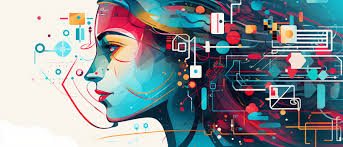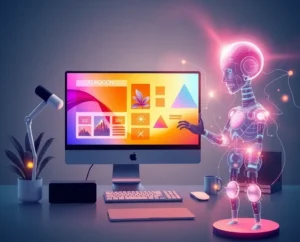Artificial intelligence (AI) is no longer confined to the realm of chatbots and virtual assistants. While tools like ChatGPT and Google Bard have captured headlines for their natural language processing capabilities, AI is quietly driving transformative changes across a wide spectrum of industries. From healthcare innovations to environmental breakthroughs and advancements in autonomous robotics, AI’s potential is redefining what technology can achieve in the real world.
1.Moving Beyond Conversations: AI’s New Frontiers
Chatbots, once the hallmark of AI’s capabilities, were initially celebrated for their ability to streamline customer service, provide instant information, and assist with everyday tasks. However, the scope of AI has grown exponentially. According to a 2024 report by McKinsey & Company, more than 60% of businesses are now leveraging AI in at least one core operational function, extending far beyond conversational systems.
a. Healthcare: AI Revolutionizing Treatments
AI is transforming how we diagnose and treat diseases. Researchers are using machine learning algorithms to predict patient outcomes, customize treatments, and even cure previously untreatable conditions. For instance:
- AI in Cancer Research: AI tools are now capable of analyzing millions of medical records and genomic data to identify cancer subtypes and suggest treatment options. According to the American Cancer Society, AI-driven tools have improved cancer detection accuracy by over 95%, significantly reducing false positives.
- Congenital Heart Defects: The Murdoch Children’s Research Institute in Australia recently announced an AI-based approach combined with stem cell technology to predict and treat heart defects before birth. Such advancements have the potential to save 40,000 newborns annually in the U.S. alone.
b. Environmental Applications: Fighting Pollution
AI is also stepping into the fight against environmental challenges:
- Plastic-Eating Bacteria: AI is being used to design enzymes that can break down plastic waste faster than ever before. In a groundbreaking study by a UK-based lab, AI-optimized enzymes were able to decompose PET plastic in just 48 hours, a process that would typically take centuries in nature.
- Wildlife Conservation: AI-powered drones are being deployed to monitor endangered species, track illegal logging, and even predict poaching activity, helping reduce wildlife crimes by 20% globally, according to the World Wildlife Fund.
c. Autonomous Robotics and Vehicles
The robotics industry has seen a surge in AI integration. Robots powered by generative AI can now handle complex tasks that were previously exclusive to humans:
- Self-Driving Cars: Companies like Tesla and Waymo are utilizing AI to make autonomous vehicles safer and more efficient. A report from Gartner predicts that 25% of all new vehicles globally will have Level 3 or higher autonomous capabilities by 2030.
- Factory Automation: Robots equipped with AI are being used in assembly lines to adapt to real-time changes, cutting production errors by 30% and saving manufacturers billions annually.
2.AI’s Economic Impact: Generative AI Taking Center Stage
Generative AI, the technology behind many of today’s advancements, is poised to contribute over $4.4 trillion annually to the global economy by 2030, as reported by a recent study from McKinsey Global Institute. Unlike traditional AI, which relies on rule-based systems, generative AI creates new outputs, whether they are images, text, or even scientific formulas.
Key Applications of Generative AI
- Design and Creativity: Artists and designers are using AI tools like MidJourney and DALL·E to generate original artworks. AI is also aiding architects in creating sustainable building designs.
- Drug Discovery: Pharmaceutical companies are leveraging AI to simulate millions of chemical reactions, accelerating drug development timelines from 10 years to just 2–3 years.
- Content Creation: Businesses are increasingly turning to AI for automated blog writing, product descriptions, and even video content production, reducing overhead costs by up to 40%.
3.Addressing Challenges: Ethics and Responsibility
Despite these advancements, the rapid proliferation of AI has raised concerns about its ethical implications. Issues like data privacy, algorithmic bias, and the potential displacement of human jobs need to be addressed.
Regulating AI Development
Governments and organizations are beginning to act. The European Union’s AI Act, expected to be enforced in 2025, will impose stricter regulations on high-risk AI systems, ensuring transparency and accountability.
AI for Social Good
At the same time, AI is being used to solve social challenges:
- In India, AI-driven education platforms are bridging gaps for rural students.
- Non-profits like X4Impact are using AI to allocate resources effectively to underserved communities.
4.The Road Ahead: AI’s Endless Possibilities
The evolution of AI beyond chatbots is just the beginning. In the coming years, AI is expected to take on even more ambitious roles:
- Space Exploration: NASA is deploying AI to analyze data from Mars missions, and future lunar colonies may rely on autonomous AI systems for maintenance and resource management.
- Predicting Pandemics: AI models are being developed to monitor global health trends, potentially identifying outbreaks weeks before they occur.
- Personalized Learning: AI-powered education platforms will customize learning experiences for every student, based on their unique strengths and weaknesses.
Conclusion: The Expanding Reach of AI
AI has moved far beyond its conversational roots, positioning itself as a transformative force across industries. From revolutionizing healthcare to combating environmental crises, the influence of AI is undeniable. As we explore this future, it’s crucial to balance innovation with responsibility, ensuring that AI remains a force for good in society.
The question is no longer whether AI will impact the world but how profoundly it will reshape every aspect of our lives. By embracing its potential while addressing its challenges, we can truly unlock the next era of human progress.


